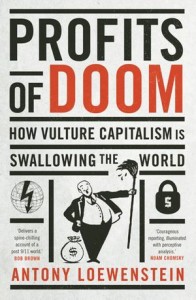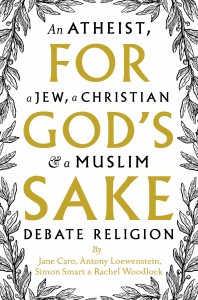Destroying US democracy from within
My book review in The Australian newspaper:
Democracy in Chains: The Deep History of the Radical Right’s Stealth Plan for America
By Nancy MacLean
Scribe, $35, 368pp
As Hurricane Irma was pounding the US, President Donald Trump made a major announcement. He wanted huge tax cuts for the wealthiest members of society.
Standing alongside Secretary of State Rex Tillerson and Commerce Secretary Wilbur Ross, Trump said that, “I think now with what’s happened with the hurricane, I’m gonna ask for a speed-up.”
Most of the mainstream media virtually ignored the announcement, rightly focused on the catastrophic weather disaster. But as Nancy MacLean, the William Chafe professor of history and public policy at Duke University, writes in the introduction to this extremely timely book, there’s an “attempt by the billionaire radical right to undo democratic governance”, and Trump’s desires fit perfectly.
Despite running as a political outsider during his contest with Hillary Clinton, Trump has appointed more economic reactionaries from investment bank Goldman Sachs, senior executives at the heart of the 2008 global financial crisis, than presidents George W. Bush and Barack Obama combined.
Defending his decision to surround himself with economic advisers he’d criticised a few months earlier, Trump said he wanted “great, brilliant business minds … so the world doesn’t take advantage of us … I love all people, rich or poor, but in those particular positions I just don’t want a poor person.”
Nobel prize-winning political economist James McGill Buchanan, a largely unknown man who inspired a generation of ultra-rich Americans that democracy was the enemy of progress, is the focus of MacLean’s investigation. Buchanan’s vision, pushed today by the billionaire Koch brothers, was designed to disenfranchise the bulk of the population because, as MacLean told US news show Democracy Now! in June, “democracy must be, in effect, shackled to prevent the majority will from being expressed because it would take too much from people of great wealth and that would be a problem for them”.
To understand the threat to democratic norms outlined by MacLean, along with the corrupting nature of opaque campaign financing by corporations and the mega-wealthy, one must appreciate the vision that’s being articulated with surprising success in the 21st century.
The Republican Party has been largely hijacked by individuals who loathe any form of compromise. Beyond that, they want “liberty”, and by that they mean the insulation of private property rights from the reach of government — and the takeover of what was long public (schools, prisons, western lands and much more) by corporations, a system that would radically reduce the freedom of the many.
Buchanan was born in Tennessee in 1919 and became a professor at George Mason University and other institutions across the US. In the age of mass segregation in US schools and the famous Supreme Court decision in 1954 — Brown v Board of Education proved that it was unconstitutional to have separate public schools for blacks and whites — Buchanan was on the wrong side of history. He worried about the government having any role in telling society how it should act. In an essay with fellow academic Warren Nutter, they stated that “every individual should be free to associate with persons of his own choosing”, a common phrasing used by segregationists.
The relationship between Buchanan and Charles Koch developed across decades. The establishment of the Cato Institute in the 1970s signalled a significant development in the evolution of their mutual hatred of government.
MacLean explains how the think tank has long had a “revolutionary” opposition to unions, intellectuals who back government intervention and corporations that crave benefits through lobbying.
Cato’s success has been across the political divide, though far stronger in the Republican Party, and pushed the American centre much further to the right. It’s no accident that such policies have led to profound economic distress for millions of Americans, at least partially explaining why many bought the lies of economic renewal sold to them by Trump.
The idea that the state should be made to almost disappear and private enterprise control all levels of society was why Buchanan became an enthusiastic supporter of Chilean dictator Augusto Pinochet (along with fellow economist Milton Friedman). He travelled to the country to help write its constitution. The torture and killings were clearly no impediment to his agenda of mass privatisation and austerity. It failed and the economy collapsed in 1982.
A key component of Buchanan’s thinking was an understanding that his policy proscriptions had to be imposed by stealth.
MacLean forensically examines why this was so necessary, in past decades and today, because the public would never approve of slow-motion privatisation and the eradication of public services. It’s why Trump and his allies could try to implement radical economic policies only during moments of societal distress or disaster. Using public shock is an opportunity too good to miss.
This book’s importance cannot be underestimated because countless policies advocated by all sides in politics today have their roots in Buchananism. From the privatisation of schools and prisons to the outsourcing of war and aid, MacLean warns that many leaders of the libertarian cause have “no scruples about enlisting white supremacy to achieve capital supremacy”.
This obviously applies to Trump but it’s simplistic to presume this problem can be solved by removing him or the Republican Party from power. Many Democrats, along with the mainstream capitalist, political class across the world in Australia, Europe and Britain, share the same goal: societies with a minimal safety net.
MacLean shows us the roots of this pernicious ideology in this powerful and disturbing book but questions whether the forces marshalled against it are strong enough to defeat it.
Antony Loewenstein is an independent journalist and author of Disaster Capitalism: Making a Killing Out of Catastrophe. He is writing a book on the global war on drugs.

 Vulture capitalism has seen the corporation become more powerful than the state, and yet its work is often done by stealth, supported by political and media elites. The result is privatised wars and outsourced detention centres, mining companies pillaging precious land in developing countries and struggling nations invaded by NGOs and the corporate dollar.
Best-selling journalist Antony Loewenstein travels to Afghanistan, Pakistan, Haiti, Papua New Guinea and across Australia to witness the reality of this largely hidden world of privatised detention centres, outsourced aid, destructive resource wars and militarized private security. Who is involved and why? Can it be stopped? What are the alternatives in a globalised world?
Vulture capitalism has seen the corporation become more powerful than the state, and yet its work is often done by stealth, supported by political and media elites. The result is privatised wars and outsourced detention centres, mining companies pillaging precious land in developing countries and struggling nations invaded by NGOs and the corporate dollar.
Best-selling journalist Antony Loewenstein travels to Afghanistan, Pakistan, Haiti, Papua New Guinea and across Australia to witness the reality of this largely hidden world of privatised detention centres, outsourced aid, destructive resource wars and militarized private security. Who is involved and why? Can it be stopped? What are the alternatives in a globalised world? 

 The 2008 financial crisis opened the door for a bold, progressive social movement. But despite widespread revulsion at economic inequity and political opportunism, after the crash very little has changed.
Has the Left failed? What agenda should progressives pursue? And what alternatives do they dare to imagine?
The 2008 financial crisis opened the door for a bold, progressive social movement. But despite widespread revulsion at economic inequity and political opportunism, after the crash very little has changed.
Has the Left failed? What agenda should progressives pursue? And what alternatives do they dare to imagine?
 The Blogging Revolution, released by
The Blogging Revolution, released by  The best-selling book on the Israel/Palestine conflict,
The best-selling book on the Israel/Palestine conflict,